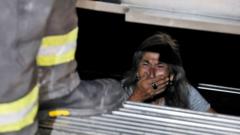Late Tuesday afternoon, a significant electricity transmission line failure plunged more than eight million households in Chile into darkness, leading to widespread chaos across the nation. This blackout caused the immediate suspension of the subway system in the capital, Santiago, forcing thousands of passengers to find alternative means to navigate the city.
Describing the suffocating atmosphere of the stalled underground train, one passenger lamented, "We felt trapped like sardines in the dark." Many other individuals also found themselves stuck in lifts as electrical systems failed, with city firefighters rushing to assist those stranded, including a woman in her seventies who recounted kicking the door of the lift to signal her distress. "I'm brave,” she shared, “I told myself 'I'm not going to die here'."
Social media was flooded with footage of metro travelers using the flashlights from their phones to find exits amid the darkness. The rapid response team from Metro de Santiago managed a swift evacuation within 90 minutes, yet the accompanying disruption echoed for hours after. Buses flooded the streets as 150 additional vehicles were deployed to accommodate the public, but it proved insufficient for the millions who typically rely on the metro, which sees an average footfall of 2.3 million daily.
Frustration mounted at bus stops as angry commuters scrambled for transport or resorted to walking under the sweltering summer sun, reaching temperatures of 30 degrees Celsius (86 Fahrenheit). Sharon Ortiz, a 28-year-old waitress, expressed her exasperation over the collapsing transport system that made her over two hours late for work, adding she had to walk extensively after getting stuck in a shopping center.
Transportation mishaps also spiraled, with significant traffic disruptions stemming from nonfunctional traffic lights leading to accidents, notably involving a truck and a car at a major intersection. Some drivers even offered rides to stranded pedestrians, while local restaurants attempted to provide reprieve to weary travelers yet faced their own operational challenges without power.
Dramatic scenes unfolded at Fantasilandia, a popular amusement park in Santiago, where guests found themselves stuck atop a rollercoaster. Although backup generators were available, they could not immediately power the rides due to safety protocols. Meanwhile, hospitals turned to emergency generators to sustain critical operations.
As night descended, the government responded to the crisis by declaring a state of emergency and instituting a curfew from 22:00 to 06:00. Law enforcement and military personnel were dispatched to maintain order during the tumult, yet amidst the chaos, some Chileans found moments of solace in the situation, sharing beautiful images of the starry night sky as light pollution diminished.
Describing the suffocating atmosphere of the stalled underground train, one passenger lamented, "We felt trapped like sardines in the dark." Many other individuals also found themselves stuck in lifts as electrical systems failed, with city firefighters rushing to assist those stranded, including a woman in her seventies who recounted kicking the door of the lift to signal her distress. "I'm brave,” she shared, “I told myself 'I'm not going to die here'."
Social media was flooded with footage of metro travelers using the flashlights from their phones to find exits amid the darkness. The rapid response team from Metro de Santiago managed a swift evacuation within 90 minutes, yet the accompanying disruption echoed for hours after. Buses flooded the streets as 150 additional vehicles were deployed to accommodate the public, but it proved insufficient for the millions who typically rely on the metro, which sees an average footfall of 2.3 million daily.
Frustration mounted at bus stops as angry commuters scrambled for transport or resorted to walking under the sweltering summer sun, reaching temperatures of 30 degrees Celsius (86 Fahrenheit). Sharon Ortiz, a 28-year-old waitress, expressed her exasperation over the collapsing transport system that made her over two hours late for work, adding she had to walk extensively after getting stuck in a shopping center.
Transportation mishaps also spiraled, with significant traffic disruptions stemming from nonfunctional traffic lights leading to accidents, notably involving a truck and a car at a major intersection. Some drivers even offered rides to stranded pedestrians, while local restaurants attempted to provide reprieve to weary travelers yet faced their own operational challenges without power.
Dramatic scenes unfolded at Fantasilandia, a popular amusement park in Santiago, where guests found themselves stuck atop a rollercoaster. Although backup generators were available, they could not immediately power the rides due to safety protocols. Meanwhile, hospitals turned to emergency generators to sustain critical operations.
As night descended, the government responded to the crisis by declaring a state of emergency and instituting a curfew from 22:00 to 06:00. Law enforcement and military personnel were dispatched to maintain order during the tumult, yet amidst the chaos, some Chileans found moments of solace in the situation, sharing beautiful images of the starry night sky as light pollution diminished.


















